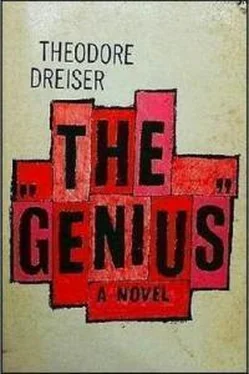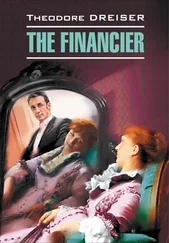Теодор Драйзер - The Genius
Здесь есть возможность читать онлайн «Теодор Драйзер - The Genius» весь текст электронной книги совершенно бесплатно (целиком полную версию без сокращений). В некоторых случаях можно слушать аудио, скачать через торрент в формате fb2 и присутствует краткое содержание. Год выпуска: 2014, Издательство: epubBooks Classics, Жанр: Классическая проза, на английском языке. Описание произведения, (предисловие) а так же отзывы посетителей доступны на портале библиотеки ЛибКат.
- Название:The Genius
- Автор:
- Издательство:epubBooks Classics
- Жанр:
- Год:2014
- ISBN:нет данных
- Рейтинг книги:4 / 5. Голосов: 1
-
Избранное:Добавить в избранное
- Отзывы:
-
Ваша оценка:
- 80
- 1
- 2
- 3
- 4
- 5
The Genius: краткое содержание, описание и аннотация
Предлагаем к чтению аннотацию, описание, краткое содержание или предисловие (зависит от того, что написал сам автор книги «The Genius»). Если вы не нашли необходимую информацию о книге — напишите в комментариях, мы постараемся отыскать её.
The Genius — читать онлайн бесплатно полную книгу (весь текст) целиком
Ниже представлен текст книги, разбитый по страницам. Система сохранения места последней прочитанной страницы, позволяет с удобством читать онлайн бесплатно книгу «The Genius», без необходимости каждый раз заново искать на чём Вы остановились. Поставьте закладку, и сможете в любой момент перейти на страницу, на которой закончили чтение.
Интервал:
Закладка:
The Old Testament was full of that. Was that. The old prophets, he learned to his astonishment, were little more than whirling dervishes when they are first encountered historically, working themselves up into wild transports and frenzies, lying on the ground and writhing, cutting themselves as the Persian zealots do to this day in their feast of the tenth month and resorting to the most curious devices for nurturing their fanatic spirit, but always setting forth something that was astonishingly spiritual and great. They usually frequented the holy places and were to be distinguished by their wild looks and queer clothing. Isaiah eschewed clothing for three years (Is. 22, 21); Jeremiah appeared in the streets of the capital (according to Muzzey) with a wooden yoke on his neck, saying, "Thus shalt Juda's neck be bent under bondage to the Babylonian" (Jer. 27; 2 ff); Zedekiah came to King Ahab, wearing horns of iron like a steer, and saying, "Thus shalt thou push the Syrians" (1 Kings 22, 11). The prophet was called mad because he acted like a madman. Elisha dashed in on the gruff captain, Jehu, in his camp and broke a vial of oil on his head, saying, "Thus saith the Lord God of Israel, I have made thee king over the people of the Lord"; then he opened the door and fled. Somehow, though these things seemed wild, yet they accorded with Eugene's sense of prophecy. They were not cheap but great—wildly dramatic, like the word of a Lord God might be. Another thing that fascinated him was to find that the evolutionary hypothesis did not after all shut out a conception of a ruling, ordaining Divinity, as he had supposed, for he came across several things in the papers which, now that he was thinking about this so keenly, held him spellbound. One was quoted from a biological work by a man named George M. Gould, and read:
"Life reaches control of physical forces by the cell–mechanism, and, so far as we know, by it solely." From reading Mrs. Eddy and arguing with Bangs, Eugene was not prepared to admit this, but he was fascinated to see how it led ultimately to an acknowledgment of an active Divinity which shapes our ends. "No organic molecule shows any evidence of intellect, design or purpose. It is the product solely of mathematically determinate and invariable physical forces. Life becomes conscious of itself through specialized cellular activity, and human personality, therefore, can only be a unity of greater differentiations of function, a higher and fuller incarnation than the single cell incarnation. Life, or God, is in the cell…. (And everywhere outside of it, quite as active and more so, perhaps, Eugene reserved mentally.) The cell's intelligence is His. (From reading Mrs. Eddy, Eugene could not quite agree with this. According to her, it was an illusion.) The human personality is also at last Himself and only Himself…. If you wish to say 'Biologos' or God instead of Life, I heartily agree, and we are face to face with the sublime fact of biology. The cell is God's instrument and mediator in materiality; it is the mechanism of incarnation, the word made flesh and dwelling among us."
The other was a quotation in a Sunday newspaper from some man who appeared to be a working physicist of the time—Edgar Lucien Larkin:
"With the discovery and recent perfection of the new ultra–violet light microscope and the companion apparatus, the microphotographic camera, with rapidly moving, sensitive films, it seems that the extreme limit of vision of the human eye has been reached. Inorganic and organic particles have been seen, and these so minute that (the smallest) objects visible in the most powerful old–style instruments are as huge chunks in comparison. An active microscopic universe as wonderful as the sidereal universe, the stellar structure, has been revealed. This complexity actually exists; but exploration has scarcely commenced. Within a hundred years, devoted to this research, the micro–universe may be partially understood. Laws of micro–movements may be detected and published in textbooks like those of the gigantic universe suns and their concentric planets and moons. I cannot look into these minute moving and living deeps without instantly believing that they are mental—every motion is controlled by mind. The longer I look at the amazing things, the deeper is this conviction. This micro–universe is rooted and grounded in a mental base. Positively and without hope of overthrow, this assertion is made—the flying particles know where to go. Coarse particles, those visible in old–time microscopes, when suspended in liquids, were observed to be in rapid motion, darting to all geometrical directions with high speed. But the ultra–violet microscope reveals moving trillions of far smaller bodies, and these rush on geometric lines and cutout angles with the most incredible speed, specific for each kind and type."
What were the angles? Eugene asked himself. Who made them? Who or what arranged the geometric lines? The "Divine Mind" of Mrs. Eddy? Had this woman really found the truth? He pondered this, reading on, and then one day in a paper he came upon this reflection in regard to the universe and its government by Alfred Russel Wallace, which interested him as a proof that there might be, as Jesus said and as Mrs. Eddy contended, a Divine Mind or central thought in which there was no evil intent, but only good. The quotation was: "Life is that power which, from air and water and the substances dissolved therein, builds up organized and highly complex structures possessing definite forms and functions; these are presented in a continuous state of decay and repair by internal circulation of fluids and gases; they reproduce their like, go through various phases of youth, maturity and age, die and quickly decompose into their constituent elements. They thus form continuous series of similar individuals and so long as external conditions render their existence possible seem to possess a potential immortality.
"It is very necessary to presuppose some vast intelligence, some pervading spirit, to explain the guidance of the lower forces in accordance with the preordained system of evolution we see prevailing. Nothing less will do….
"If, however, we go as far as this, we must go further…. We have a perfect right, on logical and scientific grounds, to see in all the infinitely varied products of the animal and vegetable kingdoms, which we alone can make use of, a preparation for ourselves, to assist in our mental development, and to fit us for a progressively higher state of existence as spiritual beings.
" … It seems only logical to assume that the vast, the infinite chasm between ourselves and the Deity, is to some extent occupied by an almost infinite series of grades of beings, each successive grade having higher and higher powers in regard to the origination, the development and the control of the universe.
" … There may have been a vast system of co–operation of such grades of beings, from a very high grade of power and intelligence down to those unconscious or almost unconscious cell souls posited by Haeckel….
"I can imagine the … Infinite Being, foreseeing and determining the broad outlines of a universe….
"He might, for instance, impress a sufficient number of his highest angels to create by their will power the primal universe of ether, with all those inherent properties and forces necessary for what was to follow. Using this as a vehicle, the next subordinate association of angels would so act upon the ether as to develop from it, in suitable masses and at suitable distances, the various elements of matter, which, under the influence of such laws and forces as gravitation, heat, and electricity, would thenceforth begin to form those vast systems of nebulæ and suns which constitute our stellar universe.
"Then we may imagine these hosts of angels, to whom a thousand years are as one day, watching the development of this vast system of suns and planets until some one or more of them combined in itself all those conditions of size, of elementary constitution, of atmosphere, of mass of water and requisite distance from its source of heat as to insure a stability of constitution and uniformity of temperature for a given minimum of millions of years, or of ages, as would be required for the full development of a life world from amoeba to man, with a surplus of a few hundreds of millions for his adequate development.
Читать дальшеИнтервал:
Закладка:
Похожие книги на «The Genius»
Представляем Вашему вниманию похожие книги на «The Genius» списком для выбора. Мы отобрали схожую по названию и смыслу литературу в надежде предоставить читателям больше вариантов отыскать новые, интересные, ещё непрочитанные произведения.
Обсуждение, отзывы о книге «The Genius» и просто собственные мнения читателей. Оставьте ваши комментарии, напишите, что Вы думаете о произведении, его смысле или главных героях. Укажите что конкретно понравилось, а что нет, и почему Вы так считаете.









